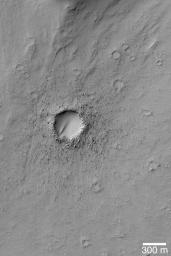Bouldery Impact Ejecta
Caption:
29 November 2004
Meteor impact craters are common the surfaces of most solid objects in the Solar System. They are least common on the volcanically-active moon of Jupiter, Io, and on Earth, where volcanism, tectonism, and erosion have all acted to erase the record of impact cratering. On Mars, erosion has also been vigorous enough to destroy craters. In other areas on Mars, craters have been filled and buried within the planet's bedrock. This October 2004 Mars Global Surveyor (MGS) Mars Orbiter Camera (MOC) image shows a relatively young impact crater on the floor of the outflow channel system of Mangala Valles. The impact ejecta blanket in this case is quite bouldery. Some windblown sediment has partially filled the crater. These features are located near 15.1°S, 149.3°W. The crater is just over 300 meters across, about one third the diameter of the famous Meteor Crater in Arizona. The 300 meter scale bar is about 328 yards long. Sunlight illuminates the scene from the upper left.
Cataloging Keywords:
| Name |
Value |
Additional Values |
| Target |
Mars |
|
| System |
|
|
| Target Type |
Planet |
Satellite |
| Mission |
Mars Global Surveyor (MGS) |
|
| Instrument Host |
Mars Global Surveyor |
|
| Host Type |
Orbiter |
|
| Instrument |
Mars Orbiter Camera (MOC) |
|
| Detector |
|
|
| Extra Keywords |
Crater, Grayscale, Impact, Volcano |
| Acquisition Date |
|
| Release Date |
2004-11-29 |
| Date in Caption |
2004-11-29 |
|
| Image Credit |
NASA/JPL/Malin Space Science Systems |
| Source |
photojournal.jpl.nasa.gov/catalog/PIA07094 |
| Identifier |
PIA07094 |

